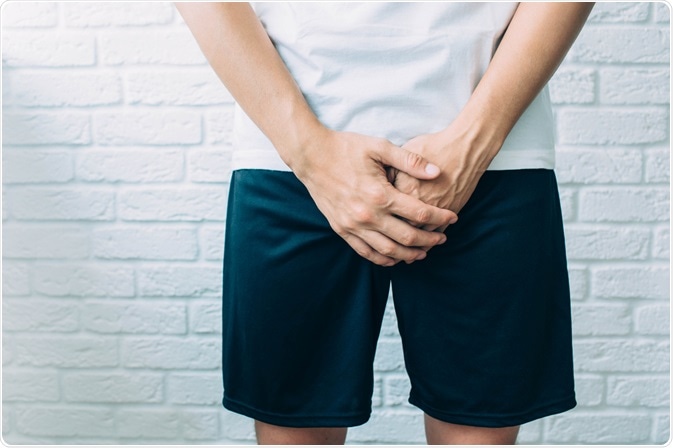Epididymitis is a health condition that involves pain and inflammation of the epididymis, as a result of various causes. The treatment for the condition typically involves pharmacological management with antibiotics and analgesic medications, complemented by rest. In severe cases, surgery may be needed to manage the condition.
 Image Credit: Peakstock/Shutterstock
Image Credit: Peakstock/Shutterstock
Treatment Considerations
Several factors should be considered before the treatment of epididymitis is commenced.
Firstly, it is essential that a correct diagnosis has been made to enable the appropriate decisions to manage the symptoms. Testicular torsion is another health condition with similar symptoms to epididymitis but is associated with severe complications and requires emergency surgery.
A urine culture should be taken for all boys with epididymitis, to investigate the cause of the condition. There is a low risk of urinary tract infection in boys with the condition, so antibiotic therapy is not routinely indicated and is reserved for infants with symptoms or those with positive urine culture findings.
Pharmacological Management
As a bacterial infection is the most common cause of acute epididymitis, antibiotics play a significant role in the treatment of the condition. This may include treatment with ceftriaxone, doxycycline, levofloxacin, or ofloxacin, depending on the causative bacteria.
In most cases, a course of approximately ten days is recommended to eradicate the infection and lead to an improvement in symptoms. It is important that patients finish the entire course of antibiotics, even if their symptoms improve before they get to the end. Additionally, it is useful to have a follow-up appointment to ensure the infection has cleared completely at the end of the course.
For chronic epididymitis, a four to six week trial of antibiotics to target likely causative bacteria, such as Chlamydia trachomatis or Neisseria gonorrhoeae, is recommended. Any recent sexual partners should also be offered treatment to limit recurrence and improve recovery rates.
Analgesic medications can help to relieve the pain associated with epididymitis. Non-steroidal anti-inflammatory drugs (NSAIDs) such as ibuprofen or aspirin may also help to reduce the swelling and associated pain.
Non-Pharmacological Treatment
Making sure that patients with epididymitis are able to rest and allow their bodies to recover is essential for treatment. Individuals should be advised to abstain from sexual intercourse during treatment.
Additionally, the pain associated with the swelling can be improved with standard injury care recommendations. This includes elevation of the scrotum and the application of cold packs to reduce inflammation. An athletic cup may also be beneficial to provide support to the scrotum.
Surgical Techniques
In the vast majority of cases, epididymitis can be managed with medications and non-pharmacological techniques. However, some patients may require surgery to manage severe epididymitis.
For example, when the formation of an abscess occurs in the scrotal region as a result of the infection, this may need to be drained with a needle. Additionally, complicated surgical techniques involving the removal of a section or all of the epididymis may be required. Structural abnormalities that are responsible for causing the symptoms may also be corrected with surgery.
Prevention
It is important that patients are aware of the possible causes of epididymitis and are equipped with the knowledge of how to prevent recurrence of the condition. In particular, it is important that individuals practice safe sex practices and make sure to always use a condom when engaging in activities with sexual partners.
References
Further Reading
Last Updated: Feb 17, 2023